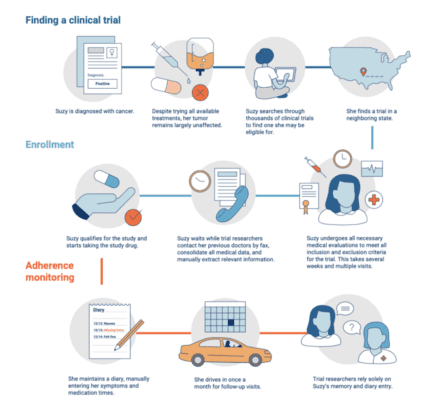Here, we’re talking about technologies that help with finding, screening, selecting, recruiting and keeping study patients. A variety of AI technologies can assist in this process. You can use NLP on clinical notes as a first pass to find patients with the right stage of disease once you know their diagnosis from the ICD-10 codes.
For example, if you’re recruiting non-small cell lung cancer patients that are in stage III or IV, the staging information isn’t coded in ICD-10. You’d need to find those patients by examining the clinical notes. Well, this might be a simple enough ask from the less-than-perfect NLP technologies we have access to today.
This would reveal patients that could then be further screened by study staff, but identifying more patients at the top of the funnel would mean faster recruitment timelines. Solutions are increasingly turning to AI to extract information from medical records to simplify the enrollment process by vetting inclusion and exclusion criteria. Deep 6 AI is using natural language processing to extract clinical data like diagnoses, symptoms and treatments from EHRs, and it can even identify patients with conditions that aren’t mentioned in EHRs to improve the match rate between clinical trials and patients.
Other opportunities for AI in this category include using it to identify and track digital biomarkers in voice, movement and other physiological biomarkers. This allows more precise diagnosis and monitoring, although many of these digital biomarkers haven’t been fully established for specific diseases or endorsed for this purpose. However, that’s clearly the direction we’re headed in. Companies in this category include nQ Medial, WinterLight Labs, VIDA, Perspectum, Quibim, IAG and IXICO. These companies are using AI to track digital biomarkers in voice, patient movements and imaging (radiology and pathology) to facilitate clinical trials.
Other solutions focus on capturing physiological data. When combined with wearable devices, AI can provide continuous, real-time monitoring for physiological and behavioral changes in patients, reducing the cost, frequency and difficulty associated with on-site checkups. AliveCor provides a wearable EKG device that uses machine learning to pick up on abnormal heart rhythms like atrial fibrillation. Meanwhile, Biofourmis is using wearable devices to track patients’ vital signs and to provide predictive health insights. The startup partnered with the University of Hong Kong to capture the temperature, heart rate and oxygen levels of patients infected with COVID-19 to detect subtle changes in health and accelerate virus research.
Another group of companies is using AI to better assess patient genetics and to identify biomarkers that better diagnose and subtype patients for more efficient treatment matching and monitoring. Companies here include Tempus and WuXi NextCODE.






